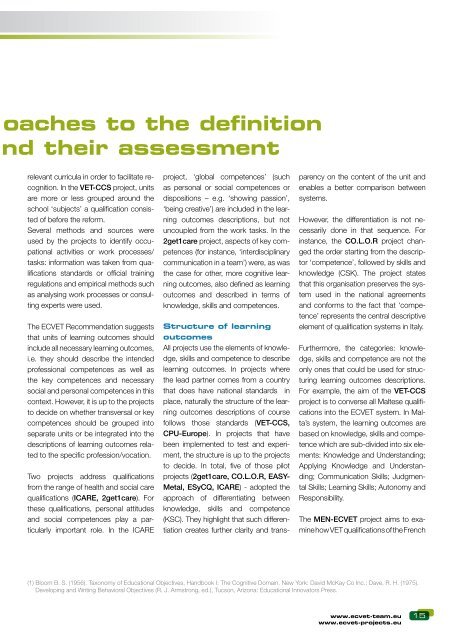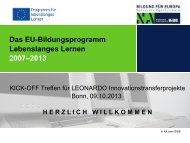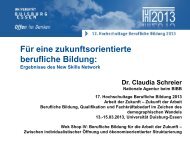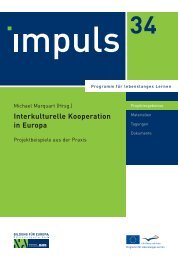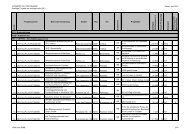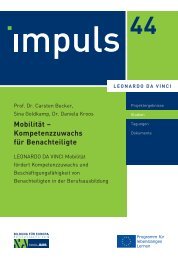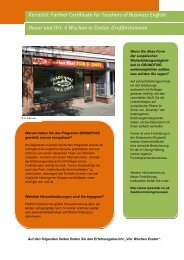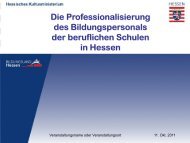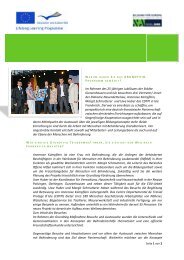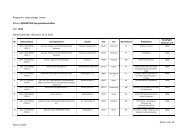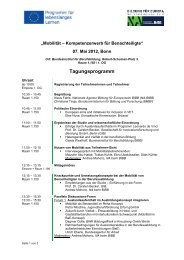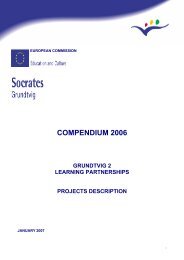You also want an ePaper? Increase the reach of your titles
YUMPU automatically turns print PDFs into web optimized ePapers that Google loves.
oaches to the definition<br />
nd their assessment<br />
relevant curricula in order to facilitate recognition.<br />
In the VET-CCS project, units<br />
are more or less grouped around the<br />
school ‘subjects’ a qualification consisted<br />
of before the reform.<br />
Several methods and sources were<br />
used by the projects to identify occupational<br />
activities or work processes/<br />
tasks: information was taken from qualifications<br />
standards or official training<br />
regulations and empirical methods such<br />
as analysing work processes or consulting<br />
experts were used.<br />
The ECVET Recommendation suggests<br />
that units of learning outcomes should<br />
include all necessary learning outcomes,<br />
i.e. they should describe the intended<br />
professional competences as well as<br />
the key competences and necessary<br />
social and personal competences in this<br />
context. However, it is up to the projects<br />
to decide on whether transversal or key<br />
competences should be grouped into<br />
separate units or be integrated into the<br />
descriptions of learning outcomes related<br />
to the specific profession/vocation.<br />
Two projects address qualifications<br />
from the range of health and social care<br />
qualifications (ICARE, 2get1care). For<br />
these qualifications, personal attitudes<br />
and social competences play a particularly<br />
important role. In the ICARE<br />
project, ‘global competences’ (such<br />
as personal or social competences or<br />
dispositions – e.g. ‘showing passion’,<br />
‘being creative’) are included in the learning<br />
outcomes descriptions, but not<br />
uncoupled from the work tasks. In the<br />
2get1care project, aspects of key competences<br />
(for instance, ‘interdisciplinary<br />
communication in a <strong>team</strong>’) were, as was<br />
the case for other, more cognitive learning<br />
outcomes, also defined as learning<br />
outcomes and described in terms of<br />
knowledge, skills and competences.<br />
Structure of learning<br />
outcomes<br />
All projects use the elements of knowledge,<br />
skills and competence to describe<br />
learning outcomes. In projects where<br />
the lead partner comes from a country<br />
that does have national standards in<br />
place, naturally the structure of the learning<br />
outcomes descriptions of course<br />
follows those standards (VET-CCS,<br />
CPU-Europe). In projects that have<br />
been implemented to test and experiment,<br />
the structure is up to the projects<br />
to decide. In total, five of those pilot<br />
projects (2get1care, CO.L.O.R, EASY-<br />
Metal, ESyCQ, ICARE) - adopted the<br />
approach of differentiating between<br />
knowledge, skills and competence<br />
(KSC). They highlight that such differentiation<br />
creates further clarity and trans-<br />
parency on the content of the unit and<br />
enables a better comparison between<br />
systems.<br />
However, the differentiation is not necessarily<br />
done in that sequence. For<br />
instance, the CO.L.O.R project changed<br />
the order starting from the descriptor<br />
‘competence’, followed by skills and<br />
knowledge (CSK). The project states<br />
that this organisation preserves the system<br />
used in the national agreements<br />
and conforms to the fact that ‘competence’<br />
represents the central descriptive<br />
element of qualification systems in Italy.<br />
Furthermore, the categories: knowledge,<br />
skills and competence are not the<br />
only ones that could be used for structuring<br />
learning outcomes descriptions.<br />
For example, the aim of the VET-CCS<br />
project is to converse all Maltese qualifications<br />
into the ECVET system. In Malta’s<br />
system, the learning outcomes are<br />
based on knowledge, skills and competence<br />
which are sub-divided into six elements:<br />
Knowledge and Understanding;<br />
Applying Knowledge and Understanding;<br />
Communication Skills; Judgmental<br />
Skills; Learning Skills; Autonomy and<br />
Responsibility.<br />
The MEN-ECVET project aims to examine<br />
how VET qualifications of the French<br />
(1) Bloom B. S. (1956). Taxonomy of Educational Objectives, Handbook I: The Cognitive Domain. New York: David McKay Co Inc.; Dave, R. H. (1975).<br />
Developing and Writing Behavioral Objectives (R. J. Armstrong, ed.), Tucson, Arizona: Educational Innovators Press.<br />
<strong>www</strong>.<strong>ecvet</strong>-<strong>team</strong>.<strong>eu</strong> 15<br />
<strong>www</strong>.<strong>ecvet</strong>-projects.<strong>eu</strong>


